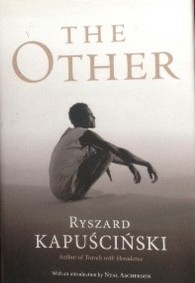Inspiring Older Readers
 posted on 21 Jul 2016
posted on 21 Jul 2016
The Other by Ryszard Kapuscinski
For many people Ryszard Kapuscinski, the Polish journalist, poet, photographer and traveller, who died in 2007, was the ultimate foreign correspondent. Seen as possibly Poland’s greatest ever writer, Kapuscinski was often mentioned as a likely candidate for a Nobel Literature prize – but it never came his way. There are photographers who believe that the secret of great photography is your willingness to engage - ‘you can never get too close’ the saying goes. Kapuscinski was a journalist who also believed this adage was one which applied to his own art – not only did he travel to some of the most inaccessible and dangerous parts of the globe, he was also prepared to put himself in physical and psychological danger. He reported with the recklessness of a war photographer and had the writing skill of a great novelist or poet.
Despite the admiration his work has garnered he is not without his critics. Probably the most damaging criticism relates to the authenticity of his experiences. There are those who claim that he increasingly failed to make a distinction between creative writing and journalism. The Guardian newspaper when reviewing Kapuscinski’s biography which was published in 2010 used an interview with the biographer to add further fuel to the fire:
Domoslawski [ the author of the biography] told the Guardian:"Sometimes the literary idea conquered him. In one passage, for example, he writes that the fish in Lake Victoria in Uganda had grown big from feasting on people killed by Idi Amin. It's a colourful and terrifying metaphor. In fact, the fish got larger after eating smaller fish from the Nile."
He added: "Kapuściński was experimenting in journalism. He wasn't aware he had crossed the line between journalism and literature. I still think his books are wonderful and precious. But ultimately, they belong to fiction."
Whilst this issue is clearly important is some contexts, in respect of this book it is of no great matter. Published posthumously in 2008 by Verso, this elegant little volume contains transcripts of lectures Kapuscinski gave in Europe in 2003-4 and three short essays that were previously unpublished. In this powerful and superbly condensed work the author tries to think about the way in which Western culture with its colonial history constructs the non-Westerner as ‘the other’. As a crucial part of creating a narrative that establishes its own identity as superior, the West needs to build an alternative story of the ‘others’ inferiority. He puts it in this way:
'all civilisations have a tendency towards narcissism and the stronger the civilisation the more clearly this tendency will appear'.
Perceptively, Kapuscinski acknowledges that we have developed a kind of duel mentality that enables us to believe two different ideas simultaneously – that everyone we meet is like us but, at the same time, in crucial and potentially dangerous ways different to us.
In my view there has been no time in the 21st century when an appreciation and understanding of this thesis on ‘otherness’ has been more important. His superbly intelligent take on multiculturalism in the last lecture notes that 'the idea of equality with the Other only occurs to the human mind very late on, many thousands of years after man first left traces of his presence on Earth.' What we know, he argues, is that in a more mobile and complex world we are going to be forced to mix more frequently than ever with ‘the other’ and how we respond will be crucial to our future. Will we respond by understanding the nature of others, accepting them as our equals or, more frighteningly, will we draw back in fear and respond accordingly?
It’s a question he leaves open but it’s one we must soon confront and find an answer to. Kapuscinski was, by temperament, an optimist about humanity but I have to admit that in post Brexit Britain I’m finding that a hard frame of mind to emulate.
Terry Potter
July 2016